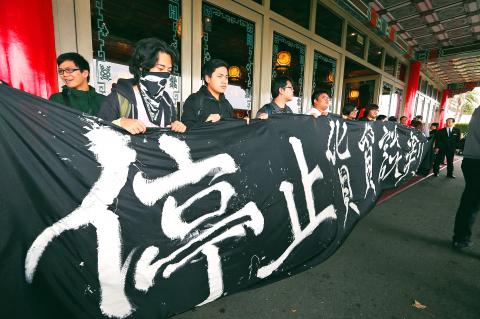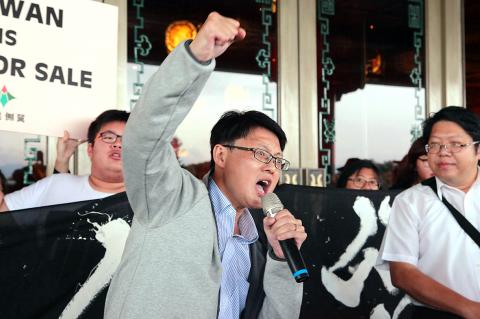The trade in goods agreement being negotiated with China would benefit large corporations at the expense of farmers and small businesses, civic activists said yesterday, calling for talks to be halted.
About 20 protesters from 10 different civic groups gathered outside the entrance of Taipei’s Grand Hotel, lining up behind a long black banner condemning the talks. The hotel is the site for the latest round of talks, which began yesterday and are scheduled to conclude tomorrow.
Protesters shouted a series of slogans demanding that government negotiators not concede the interests of farmers and workers, shouting that negotiations should be halted until there was “democratic participation” and “civic unity.”

Photo: CNA
Economic Democracy Union convener Lai Chung-chiang (賴中強) said that based on the government’s negotiating objectives, large corporations controlling the petrochemical, flat-panel display and automotive industries would be the major domestic beneficiaries of any agreement. Any Chinese concessions to the industries would be linked to opening up thousands of new product categories to Chinese imports, he said.
“The Ministry of Economic Affairs has stated that Taiwan would benefit disproportionally if tariff rates fall to zero, because China’s rates are higher than ours. What they do not say is that what China really cares about is the 22 percent of products for which we ban Chinese imports. China has not dared to sue us in the WTO because such a suit would represent a recognition of our sovereignty, but they are now trying to use the trade in goods talks to bring about the ‘normalization’ of trade,” he said.
The impact of “opening the door” would be “huge,” he said, potentially affecting processed agricultural goods, as well as the steel, textiles, electronics, electronic cabling, glass, ceramics and rubber industries.

Screen grab from Radical Flank website
“These are all tied closely with people’s livelihoods and any imports would harm grassroots labor, but the government has not let the public know the truth, much less given them the opportunity to influence the negotiations,” he said.
He said a mechanism should be established to allow small businesses to have the same access to government negotiators as large corporations, adding that any industries which benefit from a deal should be required to pay extra taxes to fund the “transition” of other industries.
“Taiwan is already reliant on China for more than 40 percent of its trade — which is ‘out of whack’ because we have basically put all of our eggs in a Chinese basket,” Radical Flank convener Chen Yi-chi (陳弈齊) said. “Given this, why in the world do we need to conduct further negotiations on trade in goods or services?”
“Pushing to open markets is not an economic policy program or industrial development program,” he said, adding that increasing the competitiveness of domestic products should take priority over efforts to cut trade barriers.
Meanwhile, about eight protesters from the Taiwan Solidary Union Youth Corps were escorted out of the Grand Hotel’s lobby by police after they charged in to protest the talks, yelling that the agricultural sector had to be protected from a clandestine trade in goods agreement.
Department of Youth Affairs director Chang Chao-lin (張兆林) said the government was playing “word games” with claims that it would not open the agricultural sector.
Restrictions on processed agricultural goods would likely be dropped, hurting farmers interests, he said.

NATIONAL SECURITY THREAT: An official said that Guan Guan’s comments had gone beyond the threshold of free speech, as she advocated for the destruction of the ROC China-born media influencer Guan Guan’s (關關) residency permit has been revoked for repeatedly posting pro-China content that threatens national security, the National Immigration Agency said yesterday. Guan Guan has said many controversial things in her videos posted to Douyin (抖音), including “the red flag will soon be painted all over Taiwan” and “Taiwan is an inseparable part of China,” while expressing hope for expedited “reunification.” The agency received multiple reports alleging that Guan Guan had advocated for armed reunification last year. After investigating, the agency last month issued a notice requiring her to appear and account for her actions. Guan Guan appeared as required,

A strong cold air mass is expected to arrive tonight, bringing a change in weather and a drop in temperature, the Central Weather Administration (CWA) said. The coldest time would be early on Thursday morning, with temperatures in some areas dipping as low as 8°C, it said. Daytime highs yesterday were 22°C to 24°C in northern and eastern Taiwan, and about 25°C to 28°C in the central and southern regions, it said. However, nighttime lows would dip to about 15°C to 16°C in central and northern Taiwan as well as the northeast, and 17°C to 19°C elsewhere, it said. Tropical Storm Nokaen, currently

‘NATO-PLUS’: ‘Our strategic partners in the Indo-Pacific are facing increasing aggression by the Chinese Communist Party,’ US Representative Rob Wittman said The US House of Representatives on Monday released its version of the Consolidated Appropriations Act, which includes US$1.15 billion to support security cooperation with Taiwan. The omnibus act, covering US$1.2 trillion of spending, allocates US$1 billion for the Taiwan Security Cooperation Initiative, as well as US$150 million for the replacement of defense articles and reimbursement of defense services provided to Taiwan. The fund allocations were based on the US National Defense Authorization Act for fiscal 2026 that was passed by the US Congress last month and authorized up to US$1 billion to the US Defense Security Cooperation Agency in support of the

A Vietnamese migrant worker yesterday won NT$12 million (US$379,627) on a Lunar New Year scratch card in Kaohsiung as part of Taiwan Lottery Co’s (台灣彩券) “NT$12 Million Grand Fortune” (1200萬大吉利) game. The man was the first top-prize winner of the new game launched on Jan. 6 to mark the Lunar New Year. Three Vietnamese migrant workers visited a Taiwan Lottery shop on Xinyue Street in Kaohsiung’s Gangshan District (崗山), a store representative said. The player bought multiple tickets and, after winning nothing, held the final lottery ticket in one hand and rubbed the store’s statue of the Maitreya Buddha’s belly with the other,